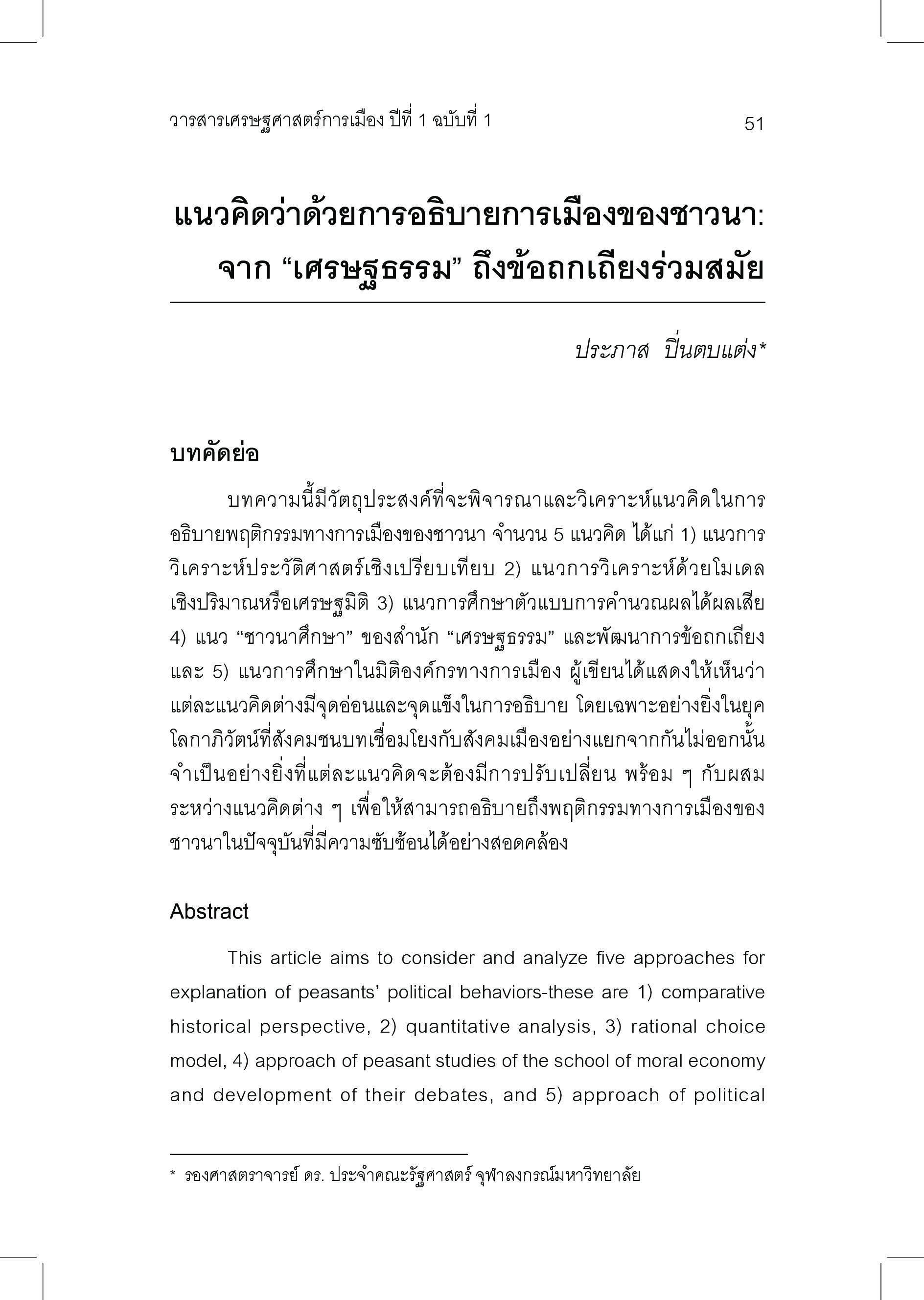The Concept of Explaining the Politics of Peasants: From "Moral Economy" to Contemporary Debates
Abstract
This article aims to consider and analyze five approaches for explanation of peasants’ political behaviors-these are 1) comparative historical perspective, 2) quantitative analysis, 3) rational choice model, 4) approach of peasant studies of the school of moral economy and development of their debates, and 5) approach of political organization analysis. The author shows that each approach occupies strengths and weaknesses in its explanation-especially, the rural societies in the era of globalization inseparably link to the urban societies. As a result of this, it is necessary for each approach to be adapted and combined together in order to explain peasants’ much more complex political behaviors at present appropriately.
References
ประภาส ปิ่นตบแต่ง. (2553). กรอบการวิเคราะห์การเมืองแบบทฤษฎีขบวนการทางสังคม. กรุงเทพฯ: คณะรัฐศาสตร์ จุฬาลงกรณ์มหาวิทยาลัย.
ผาสุก พงษ์ไพจิตร และคณะ. (2543). วิถีชีวิต วิธีสู้ ขบวนการประชาชนร่วมสมัย. กรุงเทพฯ: สำนักพิมพ์ตัวหนอน.
ยศ สันตสมบัติ. (2546). พลวัตและความยืดหยุ่นของสังคมชาวนา: เศรษฐกิจชุมชนภาคเหนือ การปรับกระบวนทัศน์ว่าด้วยชุมชนในโลกที่สาม. เชียงใหม่: บริษัทวิทอินดีไซดน์ จำกัด.
อเนก เหล่าธรรมทัศน์. (2538). สองนคราประชาธิปไตย: แนวทางการปฏิรูปการเมือง เศรษฐกิจ เพื่อประชาธิปไตย. กรุงเทพฯ: สำนักพิมพ์มติชน.
Andrew, W. (2008). The Rural Constitution and the Everyday Politics of Elections in Northern Thailand. Journal of Contemporary Asia, 38 (1), pp. 84-105.
Barrington, M. (1977). Social origins of dictatorship and democracy: lord and peasant in the making of the modern world. Middlesex: Penguin Books.
Brooke, L. (1987). Exploitation and moral economy in the southern Andes: a critical reconsideration. New York: Columbia University.
Brush, S. G. (1996). Dynamics of Theory Change in the Social Sciences: Relative Deprivation and Collective Violence. The Journal of Conflict Resolution, 40(4), pp. 523-545.
Bryceson, D. & Kay, C., & Mooij, J. (2000). Disappearing peasantries ?: rural labour in Africa, Asia and Latin America. London: ITDG Pub.
Bryceson, D. & Amal, V. J. (1997). Farewell to farms : de-agrarianisation and employment in Africa. Aldershot: Ashgate.
Charles, K. (2010). From Peasant to Cosmopolitan Villagers: Refiguring the ‘Rural’ in Northeastern Thailand. This paper was prepared for a conference on “Revisiting Agrarian Transformations in Southeast Asia” Chiang Mai, Thailand, May 2010.
Huntington, S. P. (1965). Political order in changing societies. London: Yale University Press.
Joel, M. S. (1988). Vision and Practice: The Leader, the State, and the Transformation of Society. International Political Science Review / Revue internationale de science politique, 9(1).
Jonathan, R. (2003). Southeast Asia: the human landscape of modernization and development, 2nd ed. London: Routledge. p. 386.
_______. (2008). Southeast Asian development. London: Routledge.
_______. (2010). An early critical foray into participation in Thailand. In Tracks and Traces: Thailand And the Work of Andrew Turton. Netherlands: Amsterdam University Press.
Jonathan, R. & et al. (2008). Reconfiguring rural spaces and remaking rural lives in Central Thailand. Journal of Southeast Asian Studies, 39(3), pp. 355-381.
_______. (2009). From farm to factory: village change in a rice-growing region. In Rural-urban dynamics: livelihoods, mobility and markets in African and Asian frontiers. London: Routledge. pp. 134-150.
_______. (2010). Migrant labour in the factory zone: contested spaces in the extended Bangkok Region. In Asian cities, migrant labor and contested spaces. London: Routledge.
_______. (1974). Peasants, politics, and revolution: Pressures toward political and social change in the Third World. Princeton: Princeton University Press.
Kerkvliet, T. J. (2009). Everyday politics in peasant societies (and ours). Journal of Peasant Studies, 36(1), pp. 227-243.
Marc, E. (2005). Bringing the Moral Economy Back in. to the Study of 21st-Century Transnational Peasant Movements. American Anthropologist (New Series), 107(3), pp. 331-345.
_______. (1998). Transnational Peasant Politics in Central America. Latin American Research Review, 33(3), pp. 49-86.
_______. (2009). Synergies and tensions between rural social movements and Professional researchers. Journal of Peasant Studies, 36(1), pp. 245-265.
Mark, L. (1989). An Evaluation of "Does Economic Inequality Breed Political Conflict?" Studies. World Politics, 41(4), pp. 431-470.
_______. (1990). “What makes Rational Peasants Revolutionary ?: Dilemma, Paradox, and Irony in Lichbach”, Mark Irving. Will Rational People Rebel against Inequality ? Samson's Choice. American Journal of Political Science, 34(4), pp. 1049-1076.
Mason, D. T. (2004). Caught in the Crossfire: Revolution, Repression, and the Rational Peasant. Rowman & Littlefield Publishers, Inc.
Michael, H. (2004). Weapons of the Weak and Quotidian Politics. A paper presented to the “Africa and the African Diaspora Workshop, University of Madison, Wisconsin.
Michael, K. (1980). Agribusiness and the Demise or the Rise of the Peasantry. Latin American Perspectives, 7(4), pp. 115-124.
_______. (1996). Ethnicity and Class in Latin America. Latin American Perspectives, 23(2), pp. 5-16.
_______. (1996). Reconceptualizing the peasantry: anthropology in global perspective. Boulder: Westview Press.
Peletz, M. G. (1983). Moral and Political Economies in Rural Southeast Asia. A Review. Comparative Studies in Society and History, 25(4), pp. 731-739.
Phatharathananunth, S. (2001). Civil Society in Northeast Thailand: The Struggle of the Small Scale Farmers' Assembly of Isan. The University of Leeds Institute for Politics and International Studies.
Theda, S. (1982). What Makes Peasants Revolutionary?. Comparative Politics, 14(3), pp. 351-375.
_______. (1979). State and Revolution: Old Regimes and Revolutionary Crises in France, Russia, and China. Theory and Society, 7(1/2), pp. 7-95.
Thomas, A. C. (2001). Rethinking Moral Economy. American Political Science Review, 95(1), pp. 85-95.
Vu, T. (2006). Contentious Mass Politics in Southeast Asia: Knowledge Accumulation and Cycles of Growthand Exhaustion. Theory and Society, 35(4), pp. 393-419.






